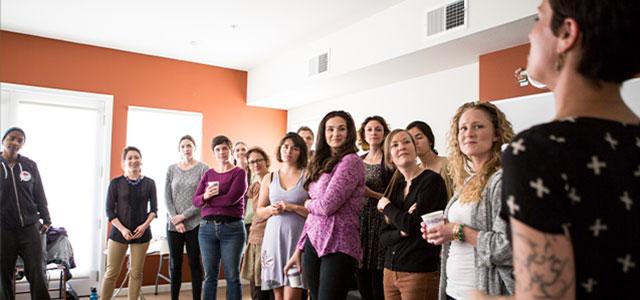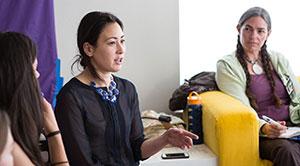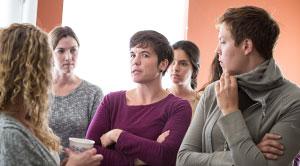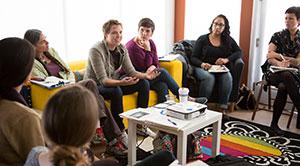
Nicole Sata (second from left) and Darcy Stanley (fourth from left) open a training session for prospective doulas (photos by Elisabeth Fall).
UCSF Students and Faculty Offer Doula Services to Transform Lives of Incarcerated Women
Over the long night and into the morning, Nicole Sata stayed by the side of the San Francisco County jail inmate she calls “A.”
Sata, then a first-year master’s entry student at UC San Francisco School of Nursing, was serving as A’s doula as A labored to give birth to a baby girl at San Francisco General Hospital. (Essentially, doulas are trained nonclinical birthing companions – a role that has existed for centuries in nearly every cultural tradition.)
As the contractions grew more intense, Sata gave A massages, guided her through meditation and helped her focus on breathing through the pain.
No one else could be with A like this. The nurses at San Francisco General, the county’s public hospital that serves jail inmates, had other patients to tend to. Security issues meant A’s family and friends would be limited to an hourlong visit.
More than anything, Sata wanted to help A enjoy a childbirth that was joyful and transformative – unlike her experience being pregnant and living on the streets or being in jail and wondering if she could count on anyone to support her.
“Pregnancy is such a unique time in a woman’s life,” Sata says. “When A’s baby was born, no matter how her baby was born, she wanted the baby to feel peaceful and to be loved.”
The Birth Justice Project
Sata’s presence during A’s labor was part of her volunteer work with the Birth Justice Project. She co-founded the project in August 2011 to provide “loving, respectful and empowered” birth and postpartum support to women at San Francisco’s jail.
A was the project’s first client. Since 2011, the project – one of the few of its kind in the United States – has provided birth doula services to 11 more women and has also facilitated women’s health and sexuality empowerment groups attended by about 100 women at the jail.
This spring and summer, the project moves into a new phase after receiving a $191,305 grant from Alameda County to expand its services – in collaboration with faculty from UCSF Schools of Medicine and Nursing and their primary partner, the Black Women Birthing Justice collective – to the county’s Santa Rita Jail. The grant includes a component where Birth Justice will offer doula training to formerly incarcerated women, as part of Alameda County’s Innovations in Reentry grant program, which supports projects to reduce recidivism among formerly incarcerated men and women.
As part of the grant, Sata and co-founder Darcy Stanley, who is finishing her RN program at Cal State East Bay this spring, will investigate whether providing doula services strengthens the pregnant, incarcerated women’s bonds with their new babies and helps ease these women back into their communities upon release.
Mothers Behind Bars
 Nicole Sata (center) Offering a program that focuses on incarcerated women who are pregnant is crucial, Sata and Stanley say. While according to the FBI, women may be responsible for only about 25 percent of all crimes committed in the United States, their incarceration rates are growing at nearly twice the rate as that of men, according to the Sentencing Project.
Nicole Sata (center) Offering a program that focuses on incarcerated women who are pregnant is crucial, Sata and Stanley say. While according to the FBI, women may be responsible for only about 25 percent of all crimes committed in the United States, their incarceration rates are growing at nearly twice the rate as that of men, according to the Sentencing Project.
More than 200,000 women are housed in US jails and prisons, and more than 1 million are on probation or parole, mostly for nonviolent offenses. Moreover, more than half of these women are parents, and nearly half of these were the sole custodial parent before being locked up, according to the US Department of Justice.
While incarcerated, pregnant women in San Francisco can usually count on access to decent health care provided by jail or clinical staff. At jails and prisons across the country, access to care is variable. For some who had been living on the streets, it may be their first opportunity to see a nurse or doctor, says Carolyn Sufrin, an assistant professor in UCSF’s Department of Obstetrics, Gynecology & Reproductive Sciences. Sufrin ran the OB-GYN clinic at the jail and is mentoring Sata and Stanley on the project.
What’s lacking for incarcerated women is the full range of other support that most pregnant women take for granted: regular contact with friends and family, as well as prenatal classes in nutrition, exercise and self-care, not to mention classes that prepare them for the physical and emotional demands of labor, birth and breastfeeding.
Services that encompass basic health and sexuality education and emotional support can be especially valuable for incarcerated women. Most have survived traumatic childhoods and sexual violence or mental illnesses or substance abuse problems. Typically, they also come from impoverished backgrounds, and some have been homeless.
In addition, once labor starts, incarcerated women can’t count on someone they trust being with them. Once they are at the hospital, a nurse will check in periodically, but she usually has to focus on the “technical” aspects of labor – blood pressure, fetal monitoring – not the mother’s “emotional” needs, says Monnie Efross, a labor and delivery nurse and UCSF School of Nursing alumna, who directs San Francisco General’s volunteer doula program. When the nurse leaves, the mother is alone, perhaps with a guard posted outside her room.
Most agonizing of all: many of these women still have time left to serve, so within a day or two after birth, they have to relinquish custody of their newborns to either a relative or foster care. The former was the case for A.
The Doula Tradition
Even under the best of circumstances, pregnancy can be stressful. Studies over the years have shown that the continuous presence of doulas for all women shortens labor, reduces the need for pain medication and cesarean deliveries and promotes mother-child bonding.
The doula tradition goes back centuries, spans cultures and comes from the practice of women in a family or community offering physical, emotional and practical support to a mother before, during and after birth.
Modern-day doulas receive professional training in nonclinical aspects of pregnancy, childbirth and postpartum care, from guiding a mother in relaxation techniques to helping her and her partner stay informed about their options during labor, according to a position paper, “The Birth Doula’s Contribution to Modern Maternity Care,” published by DONA International, the world’s largest doula association.
Unlike nurses or midwives, doulas don’t perform vaginal exams or other clinical duties. They also don’t diagnose conditions, offer medical advice or project their personal viewpoints about childbirth onto the mothers. Their role is to help the woman “have a safe and satisfying childbirth as the woman defines it,” the paper reads.
Mostly what women need is a safe, quiet place to labor, Efross says, as well as the comfort of someone like a doula who can assure her the pain won’t last forever and help her communicate her needs to hospital staff.
Becoming Doulas
 Darcy Stanley (center) Sata and Stanley both grew up in the East Bay and had long been fascinated by childbirth. They tried other fields of study and jobs before concluding they wanted to become nurses so they could support and empower women through this time in their lives.
Darcy Stanley (center) Sata and Stanley both grew up in the East Bay and had long been fascinated by childbirth. They tried other fields of study and jobs before concluding they wanted to become nurses so they could support and empower women through this time in their lives.
One way to get practical experience in childbirth and serve their community before and during their nursing studies was to train as doulas. They signed up for San Francisco General Hospital’s volunteer doula program, which Efross founded in 2003 to provide underserved patients, including jail inmates, with doula services during labor and delivery.
At a regular meeting for volunteer doulas in August 2011, Sufrin gave a presentation about the challenges facing incarcerated pregnant women, including facts on health disparities and conditions in jails.
“That really got to us,” Stanley says. Pretty much at the same moment, Sata and Stanley knew they wanted to help. They got together a group of doulas to discuss how they could provide care to the women at the jail.
It turns out the doulas were charting some new territory. The only similar program they could find was operating in Seattle’s King County Jail. Results from that program were encouraging. A pilot study found that doulas could be part of comprehensive health care and support services that are “one step toward interrupting cycles of addiction, neglect, violence, economic deprivation and eventual loss of children.”
Within six weeks, then San Francisco Sheriff Michael Hennessy gave Sata, Stanley and other volunteers clearance to come into the jail. Their project also provided health education classes at the jail and at Jelani House, a residential drug rehab facility for pregnant women and parents with infants and young children.
They faced steep learning curves. Visiting A for her first prenatal visit marked the first time Sata had been inside a jail. A’s personal history also introduced Sata to the levels of abuse that some people suffer, as well as to the isolating realities of jail life.
A’s need to share her experiences helped Sata and Stanley shape the format of health education they offered at the jail. In a small group, they would introduce a topic – anything from sexual and reproductive health to healthy relationships – then let the women dictate the discussion’s flow.
“We made it to fit their needs,” Stanley says. In this way, the class was based on a doula philosophy that emphasizes respect and collaboration. “Other classes at the jail are trying to get these women to do something or stop doing something. In birth work, you’re never trying to get a woman to do something. We tell women, ‘We’re just there to support you, and to listen to you and learn from you.’ That’s where the empowerment comes from. If you teach people to set boundaries, they’ll do the right thing.”
A Special Time
After A’s labor started on a February afternoon in 2012, she was brought to SF General. Sata arrived around 5 o’clock.
For a while, A resisted pain medication. Sata played music, and the two sang and danced. “They were songs from when I was in high school, and we were about the same age,” says Sata.
A’s baby girl arrived around 5 the next morning. A gave her daughter the middle name “Nicole” in honor of her doula and her sister. What A said to Sata suggested she was determined to raise her little girl right, once she was released and regained custody from her mother: “You know I’ve been a mom, but today is the first time I feel like a mother.”
The Next Phase
 As in San Francisco, the Birth Justice Project’s Alameda County expansion will provide childbirth preparation and labor and postpartum support to pregnant women. That includes when they leave custody and return to their communities.
As in San Francisco, the Birth Justice Project’s Alameda County expansion will provide childbirth preparation and labor and postpartum support to pregnant women. That includes when they leave custody and return to their communities.
What’s new with the Alameda County program is the doula training. Its first class will comprise up to 18 women living in Alameda County, some of whom are former inmates. The first class is expected to begin in July.
Doula training offers a unique vocational experience for former inmates, Sata says, especially because a qualified doula doesn’t have to work for someone else or register with an agency that would bar employment because of a criminal record. “It’s completely irrelevant if you’ve been incarcerated before,” Sata says. “As a vocational training opportunity, that’s very exciting.”
Being a doula could also offer a stepping-stone to other health careers, as it has for Sata and Stanley.
For the trainees, the word doula may be unfamiliar, but they will likely understand the concept because they’ve given birth themselves or been with sisters, friends or daughters giving birth.
“I’ve never had children,” Stanley says. “I’ve been trained, but I don’t know what that feels like. These women can teach me about having a baby. That’s the really great part of groups and classes and being a doula: drawing from everyone’s wisdom.”
The training will follow the curriculum that Efross developed five years ago for her own doula trainings. Sufrin and Monica McLemore, an assistant professor in the Department of Family Health Care Nursing, are also providing administrative and logistical support for the project.
Hope for the Future
Sata and Stanley lost touch with A, though they have reason to hope she gained enough from her positive birth experience that she’s been able to turn a corner in her life.
For one thing, A’s mother was able to take custody of the baby, improving the chances of reunification. Sata last saw A several weeks after the birth. She was pumping breast milk to give to her daughter, and she breastfed her when her mother brought the baby to visit.
“A’s story is really important because she’s a symbol of the racism, poverty, mental health problems and substance abuse issues that affect this population,” Sata says. She hopes their program will become a model for how society can tackle some of these major social issues. As doulas, they are reaching the women they want to help at a time when they are likely to contemplate serious change.
“When a woman brings a baby into the world, she wants to re-evaluate everything she’s doing in her life,” Sata says.



